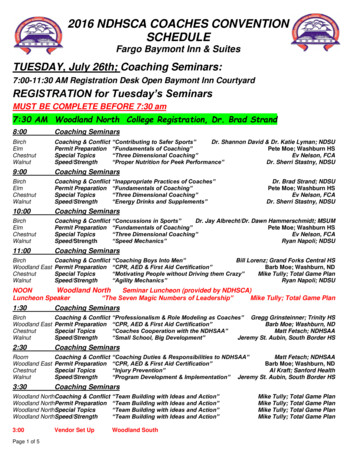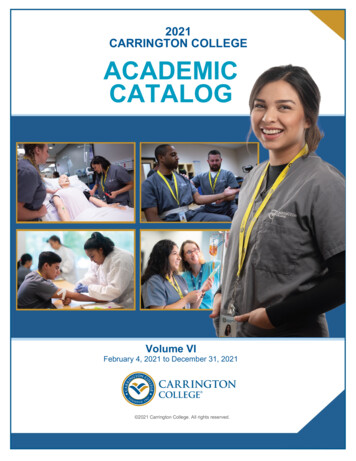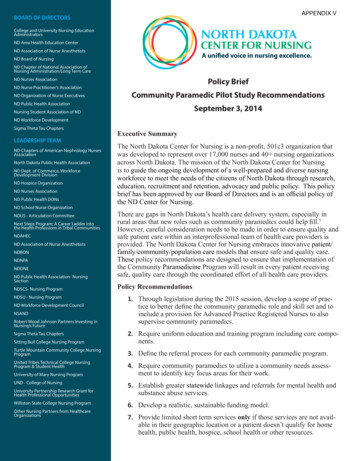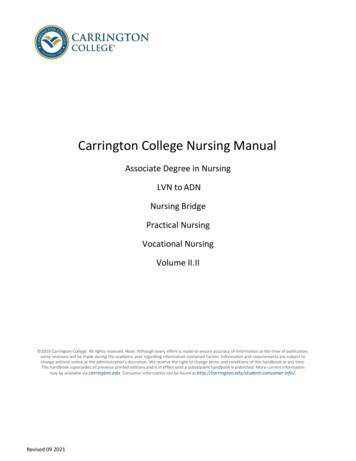
Transcription
Carrington College Nursing ManualAssociate Degree in NursingLVN to ADNNursing BridgePractical NursingVocational NursingVolume II.II 2019 Carrington College. All rights reserved. Note: Although every effort is made to ensure accuracy of information at the time of publication,some revisions will be made during the academic year regarding information contained herein. Information and requirements are subject tochange without notice at the administration’s discretion. We reserve the right to change terms and conditions of this handbook at any time.This handbook supersedes all previous printed editions and is in effect until a subsequent handbook is published. More current informationmay be available via carrington.edu. Consumer information can be found at ed 09 2021
Table of ContentsWelcome to Carrington College. . 5The drive and will to succeed and achieve your goal must come from you. . 5Carrington College Mission/Philosophy . 61 Nursing Mission, Goals, Outcomes, Philosophy. 71.1 Nursing Program Goals . 71.2 Nursing Program Philosophy . 71.3 Nursing Program Conceptual Framework . 9Roles of the Professional Nurse (Registered Nurse) . 10Roles of the Practical and Vocational Nurse (PN/VN) . 102 Classroom . 122.1 Confidentiality . 122.2 Textbooks . 122.3 Recording Devices in Clinical Settings . 132.4 Grading. 132.5 Due Dates . 132.6 Examination Procedure . 132.7 Testing Procedures . 142.8 Lab and Clinical Make-Up Work Information . 142.9 New or Changes in Policies, Procedures and Program Information . 152.10 Standardized Testing Subject Matter Exams (SME) . 153 Laboratory Environments . 153.1 Lab (Science and Nursing) . 153.2 Clinical Simulation Lab (CSL) . 163.2.1 General Information . 163.2.2 Simulation . 163.2.3 Simulation Scenarios . 173.2.4 What is debriefing? . 173.2.5 General CSL Guidelines . 173.2.7 Student Preparation Expectations/Dress Code for Clinical Simulation Lab . 183.2.8 Physical Limitations . 183.2.9 Equipment Use . 19Revised 09 2021
3.2.10 Safety Guidelines. 193.2.11 Security . 193.2.12 Clinical Simulation Lab (CSL) Confidentiality Agreement . 194 Student . 204.1 Professionalism and the American Nurses Association (ANA) Code of Conduct . 204.2 Professionalism in Relation to the American Nurses Association Code of Ethics for Nurses. 204.3 Professional Attitude and Behaviors . 224.4 Chain of Command . 224.5 Attendance Policy . 224.6 Leave of Absence Policy . 224.7 Transition Orientations. 224.8 Notices / Information Bulletin Boards . 234.9 Preparation for Graduation and Licensure . 234.10 Review Courses . 235 Medication Administration Proficiency Exam (MAPE)/Dosage Calculation . 235.1 The MAPE Passing score is 100% . 235.2 Preparation & Remediation . 245.3 Testing Rules. 246 Clinical Guidelines . 246.1 Student Orientation . 246.2 Dress Code for Campus, Clinical, and Laboratory Experiences . 246.3 Clinical Compliance Requirements . 266.4 Clinical Attendance . 266.5 Clinical Assignments. 276.6 Clinical Cancellation . 276.7 Clinical Grading . 276.7.1 Clinical Evaluation Tool. 276.7.2 Care Plans . 286.7.3 Clinical Skills Check-Off . 286.8 Student Accountability in Clinical Areas . 296.9 Competencies and Functional Abilities . 306.10 Transportation . 30Revised 09 2021
6.11 Professional Boundaries . 306.12 Braces, Splints, and Casts in the Clinical Setting . 306.13 Physical Limitations or Health Issues . 306.14 Breast Pumping . 316.15 Infectious Diseases and Standard Precautions . 316.16 HIPAA Regulations/Patient Confidentiality for Nursing Students . 316.17 Student Employment While in the Nursing Program . 316.18 Negligence, Drug and Alcohol Use Related to Clinical Sites and Nurse Practice Acts . 327 Nursing Programs Shared Governance . 327.1 Student Representatives . 337.2 Student Council By-Laws . 347.2.1 Purpose . 347.2.2 Function . 347.2.3 Membership . 347.2.4 Elected Officers/Leaders. 357.2.5 Term of Office . 357.2.6 President . 357.2.7 Vice President . 357.2.8 Secretary . 357.2.9 Responsibilities of the Officer members: . 357.2.10 Faculty Representative Mentor . 367.2.11 Absences . 367.2.12 Membership Meetings. 367.3 Committees . 367.4 Amendments . 368 National Organizations for Student Nurses . 379 Accreditation and Approvals Information. 38References . 39Revised 09 2021
Welcome to Carrington College.Welcome to Nursing.This manual applies to all students attending the Associate Degree in Nursing, Registered Nursing LVN to ADN,Nursing Bridge, Practical Nursing, and Vocational Nursing programs at a Carrington College campus. The intentof this manual is to provide you with important policies, procedures and guidelines that will facilitate yoursuccess in the program you have chosen. It is not meant to replace the Carrington College Academic Catalog orthe Student Handbook, but rather to augment and assist you to identify issues and policies specific to thenursing programs. The Carrington College Nursing Manual along with the Student Handbook and AcademicCatalog are the primary sources of policy information.As a nursing student, you will be exposed to a plethora of educational experiences designed to help guideyou into the ever-increasing role of professional nursing. With this comes responsibility and accountabilityfor your education, including gaining the skills, knowledge, and attitude for a successful completion of thisprogram.The drive and will to succeed and achieve your goal must come from you.On behalf of Carrington College faculty and staff, the Deans of Nursing would like to welcome you toCarrington College and your nursing program. You are about to embark on an exciting and challengingjourney as you prepare to become a professional nurse.I attribute my success to this – “I never gave or took any excuse.” Florence Nightingale“You are not here merely to make a living. You are here in order to enable the world to live moreamply, with greater vision, with a finer spirit of hope and achievement. You are here to enrich theworld, and you impoverish yourself if you forget the errand.” Woodrow Wilson“Let me dedicate my life today to the care of those who come my way. Let me touch each one with ahealing hand and the gentle art for which I stand. And then tonight when the day is done, let me rest inpeace if I've helped just one." -Author unknown“Nursing is an art: and if it is to be an art, it requires an exclusive devotion as hard a preparation, asany painter’s or sculptor’s work; for what is the having to do with dead canvas or dead marble,compared with having to do with the living body, the temple of God’s spirit? It is one of the Fine Arts:I had almost said, the finest of Fine Arts.” Florence NightingaleBest Wishes!Deans of NursingRevised 09 2021
Carrington College Mission/PhilosophyThe mission of Carrington College is to provide learning opportunities to individuals in the communities itserves through postsecondary programs of study, which include general studies and professional preparationin career focused majors.The college achieves its mission by:Offering associate degree and certificate programs in health care, wellness, legal, business and technicaldisciplinesProviding a supportive, student-centered learning environment, which enables students to meet theireducational and career goals and achieve positive learning outcomesUsing a skills-based and outcomes-based approach to educationProviding excellent educational programs and services to students on-site and online that meet student,employer, and community needsThe Carrington College philosophy is based on outcome-based learning. The College’s focus on retention,career services, and job performance results in graduates who are highly qualified and motivated employees.The communities served by the College benefit from this focus on outcome-based learning and the College’sability to adapt to society’s changing needs.Our faculty, administrators, and staff are committed to students developing specific vocational knowledgeand skills, as well as mastering learning outcomes throughout their experience at Carrington College. TheCollege models its programs and curricula objectives to align with the College's institutional learningoutcomes encompassing critical thinking, collaboration, communication, and professionalism.In degree programs, a broad base of general education course offerings provide students withcommunication, critical thinking, mathematical and computer skills; as well as perspectives from thesciences, humanities and social sciences.Carrington College encourages students to work to achieve their highest potential while attaining theircareer goals. The College strives for excellence and quality in everything it does and instills in its students thesame aspirations.Revised 09 2021
1 Nursing Mission, Goals, Outcomes, PhilosophyThe mission of the Carrington College Registered Nursing, Registered Nursing LVN to RN, Nursing Bridge,Practical Nursing, and Vocational Nursing programs (hereafter, ‘nursing program’ or ‘the program’) is toprovide nursing students with the opportunity to develop knowledge, skills and attitudes needed to gainentry into the nursing profession. The nursing program prepares graduates for entry-level nursing positionswhere they will provide quality health care services in diverse settings and function as providers of patientcentered care, members of a health care team, members within the profession and patient safety advocate(TBON, 2018).1.1 Nursing Program GoalsThe ultimate goal of the nursing education program is to develop graduate nurses who are prepared topromote and enhance human flourishing; to demonstrate sound nursing judgment; to continuously developtheir own unique professional identity; and to develop and maintain an inquiring mind as she or he movesinto the world of nursing practice and beyond (NLN, 2018).1.2 Nursing Program PhilosophyThe nursing faculty of Carrington College believes that nursing is a dynamic, evolving art and sciencediscipline that involves application and facilitation of knowledge, skills and attitudes necessary to supporthuman flourishing defined as an endeavor to achieve self-actualization and fulfillment of individuals within alarger community. Human flourishing encompasses the unique diversity of holistic wellbeing for patients andfamily. They believe that nursing practice is based on specific nursing knowledge together with a foundationderived from the biological, behavioral and social sciences.Nursing knowledge skills and attitudes arise from a technical, interpersonal, ethical, legal, leadership andscientific inquiry basis. (NLN, 2018)Nurses function in a variety of health care settings as providers of patient-centered care, members within adiscipline, and members of a health care team and patient safety advocate. Through nurse-patientcollaboration, the health needs of individuals and family in communities with diverse cultural backgroundsand lifestyles are addressed to promote optimal levels of functioning to support human flourishing. (TBON,2018)A person is an individual with biological, psychological, social, cultural, spiritual and developmentaldimensions. A person’s health is influenced by their constant interaction with the environment and has thepotential to flourish through interaction with the environment.Environment impacts the person through interacting with internal and external components.Health is comprised of wellness and illness dimensions with both subjective and objective dimensions but isalways viewed from the perspective of the person.Revised 09 2021
Nursing is a caring profession that promotes health, healing and hope in response to human conditions.Nurses provide concern and consideration for the whole person and reach out to those who are vulnerable.Nurses recognize and respond to differences among people and their families’, ideas, values and ethnicities.They affirm and embrace uniqueness, and value each person respecting the dignity, values, behaviors,environment, social norms, cultural values, physical characteristics, experiences, religious beliefs andpractices of each without condition or limitation. They encourage, expect, and value open communicationand ethical decision making.Nurses provide an essential service to patients in an ever-changing health care delivery system. They arecommitted to continuous growth with a goal of excellence within themselves and the environment in whichthey practice. Nurses must make complex decisions, adapt to new situations, and continually updateknowledge and skills utilizing clinical decision making as an integral process. The nurse is accountable forabiding by all laws and regulations related to nursing practice within an ethical context. The nurse uses aprocess to approach care that is a systematic, problem-solving method used to identify, prevent, alleviateand protect, promote and restore health.The nurse develops and implements therapeutic nursing interventions to support patients in adapting todimensions of health. Nursing practice is based upon standards of practice and an ethical and legalframework.The nurse effectively communicates to provide nursing care, patient education and leadership.Graduates of the nursing programs at Carrington College function in a variety of health care settings to applyprofessional standards, apply health promotion and disease prevention strategies, and conduct transculturalhealth assessments and interventions (NLN, 2018).Nursing has different levels of education and scopes of practice. The Licensed Practical and VocationalNurses provide nursing care within a directed scope of practice under appropriate supervision. Patients forthe Licensed Practical and Vocational Nurse are individuals in the context of their families with predictablehealth care needs. The entry level Associate Degree in Nursing (ADN) provides direct nursing care to, orcoordinates care for a limited number of patients in various health care settings; the patients may havecomplex multiple needs with predictable or unpredictable outcomes. Patients for the ADN are individualsand their families (TBON, 2018).Learning is a continuous, life-long process that involves changes in knowledge, attitudes, and behavior.Learning, teaching, and evaluation are shared processes that support personal development and stimulateinquiry in students. Education is an integral component of each student’s personal and professional growthand development. The student is viewed as a self-directed learner who is committed to life-long learning.Faculty view education as a process of continuous improvement enhanced by appropriate educationalRevised 09 2021
pedagogy that supports student development as a professional nurse.Various learning experiences, both individual and group, are provided to meet and enhance individualstudent learning styles. Clinical learning experiences expose students to diverse health care settings withinthe community. These experiences provide the nursing student an opportunity to develop the core values ofcaring, diversity, integrity, excellence, ethics, patient-centeredness, and holism identified by the NationalLeague for Nursing (NLN, 2018). Nursing students are accountable for learning by assuming an active roleand by sharing responsibility in meeting learning outcomes. The student is expected to:1. Develop the appropriate study skills necessary to be successful, considering one’s own culturaland ethnic background, learning styles and goals.2. Engage in the learning process using critical thinking skills.3. Work independently and interdependently in multiple and varied learning experiences.4. Increase awareness of their and other’s knowledge and behaviors, and how they affect nursingpractice.5. Accept change as a process and product of learning acquisition.6. Demonstrate commitment to the knowledge and continued learning skills and attitudes inherentin the practice of professional nursing.7. Engage in the ongoing process of evaluation and continued learning.8. Develop an approach to learning that will assist in creating and planning an organized balance inlife by developing a support system.The Carrington College nursing faculty are committed to providing students with a program that providesinstruction that will:1. Develop highly educated, knowledgeable, skill-oriented graduates who possess the necessaryknowledge, skills and attitudes that can transition into entry-level roles and serve the needs ofthe community.2. Prepare graduates to successfully take the appropriate National Council Licensure Examination(NCLEX).3. Provide quality didactic instruction, laboratory facilities and clinical experiences.4. Provide quality clinical training that prepares graduates to perform nursing skills competently.5. Advance the profession of nursing by articulating with institutions of higher education fortransfer of credits.1.3 Nursing Program Conceptual FrameworkIn addition to the mission and philosophy, the nursing faculty believe that with the rapidly changing healthcare environment, a nurse must be able to think critically and make appropriate decisions. The nurse alsoneeds to apply the nursing process when assisting patients to adapt to changes in the wellness-illnessdimension. The central component of Carrington College’s nursing curriculum is the application of thenursing process and utilization of critical thinking in a professional manner. When nursing is viewed from thiscentral component perspective, four role-specific professional competencies of the graduate nurse evolve.Those roles include:Revised 09 2021
Roles of the Professional Nurse (Registered Nurse)1. Nurse as a professional provider of patient centered care2. Nurse as a professional member within the profession3. Nurse as a professional member of a health care team4. Nurse as a patient safety advocateRoles of the Practical and Vocational Nurse (PN/VN)1. Nurse as a provider of patient-centered care2. Nurse as a member within the profession3. Nurse as a member of the health care team4. Nurse as a patient safety advocateWithin each of these roles reside the core values and integrating concepts that are the basis for all ofCarrington College’s nursing program curricula. These include:Core Values: The NLN (2018) core values, implicit in nursing's historic paradigm, are foundational for allnursing practice. These values are caring, diversity, ethics, excellence, holism, integrity, and patientcenteredness. They are shown at the root of the model, to indicate that each type of nursing program andeach type of competency must be grounded in these fundamental values.Integrating Concepts: Six integrating concepts are derived from the core values – context and environment;knowledge and science; personal and professional development; quality and safety; relationship-centeredcare; and teamwork. These concepts are shown as bands around the program outcomes, illustrating theirprogressive and multidimensional development in students during their learning experiences. The criticalfeature of the bands is an enveloping feedback mechanism that acknowledges the ongoing advancement ofnursing education, as new graduates return new learning, gleaned from multiple sources, to nursing practicethrough nursing education. In this way, nursing practice and nursing education remain perpetually relevantand accountable to the public and all those in need of nursing.End-of-Program Student Learning Outcomes: The goals of nursing education for each type of nursingprogram can be summarized in three broad program outcomes. The three outcomes are: 1) nurses must usetheir skills and knowledge to enhance human flourishing for their patients, their communities, andthemselves; 2) they should demonstrate sound nursing judgment and should continually develop theirprofessional identity; 3) nurses must approach all issues and problems in a spirit of inquiry. All essentialprogram-specific core nursing practice competencies and course learning outcomes are assumed withinthese three general aims.The ultimate goal of this program is to graduate mature, expert learners who can demonstrate competencein:1. Human Flourishing: Advocate for patients and families in ways that promote their self-Revised 09 2021
determination, integrity and ongoing growth as human beings.2. Nursing Judgment: Make judgments in practice, substantiated with evidence, that integratenursing science in the provision of safe, quality care and promote the health of patients withina family and community context.3. Professional Identity: Implement one’s role as a nurse in ways that reflect integrity,responsibility, ethical practices and an evolving identity as a nurse committed to evidencebased practice, caring, advocacy, and safe, quality care for diverse patients within a family andcommunity context.4. Spirit of Inquiry: Examine the evidence that underlies clinical nursing practice to challenge thestatus quo, question underlying assumptions, offer new insights to improve the quality of carefor patients, families and communities.The nursing theoretical content requires students to relate information from required courses to the processof interpreting patient data, planning patient-centered effective interventions and evaluating patientresponses. To foster critical thinking and the application of the nursing process, a variety of learningexperiences and teaching strategies are utilized such as patient simulations, case studies, clinical activitiesand interactive video/computer-assisted instruction and cooperative learning. Since the application ofnursing knowledge to nursing practice requires more than merely learning a specific skill or task, studentsare asked to substantiate problems and action with appropriate rationale; address individual patientdifferences; review legal and ethical considerations; and teach others how to perform the necessary skills.These behaviors require utilization of critical th
Nursing is a caring profession that promotes health, healing and hope in response to human conditions. Nurses provide concern and consideration for the whole person and reach out to those who are vulnerable. Nurses recognize and respond to differences among peopl
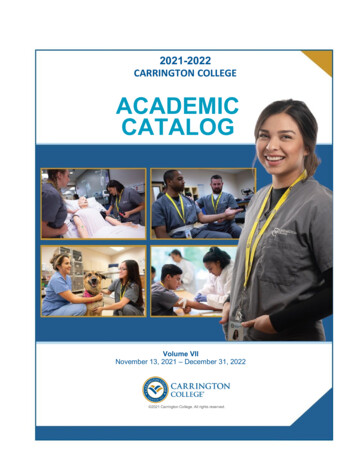
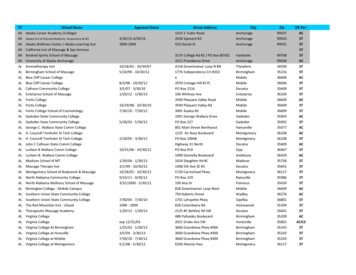
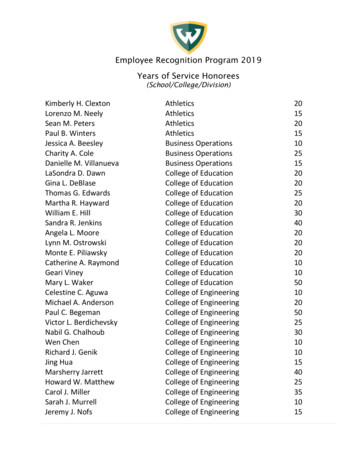
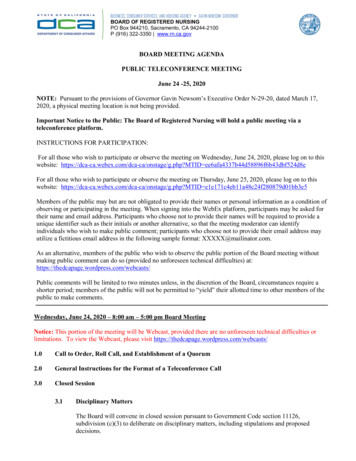
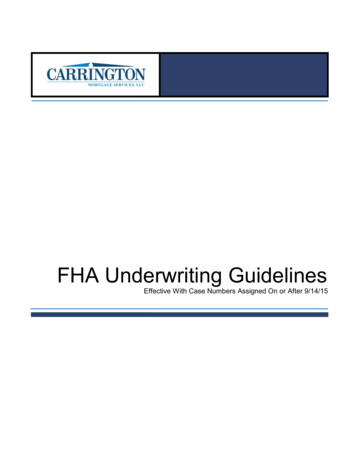
![WILLS, ESTATES TRUSTS 650] - Thurgood Marshall School of Law](/img/19/carrington-syllabus-202019-20-2020.jpg)
